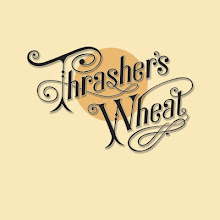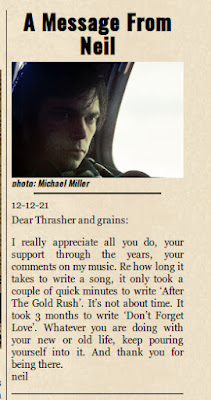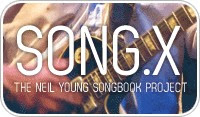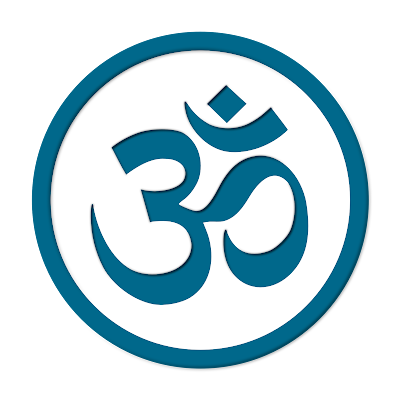Comments of the Moment: Neil Young's "Quintessential" Greendale

The Inconvenient Truth of
Greendale
Recently, we posted over to the ever-so irrepressible Scotsman's Patreon on Dynamite Tracks #18: Busting out of Jail regarding Neil Young's album Greendale and it's significance.
First, a comment by Ron on the above post:
I hope no-one will be offended if I say am trying hard, but I still don't get what it is they think is important about Greendale - sorry.
The lyrics tell a tale that is interesting, the characters are all relatable, but I don't see or hear anything revelatory or new - and I don't think I did when it was first released 20 years ago either. And I listened to it a lot when it first came out and remember having fun exploring the accompanying Greendale web site.
I can see that there are likely aspects of Neil's character and personality in a lot or maybe all of the characters, I can see that it touches on a lot of the problems of the world, but is there an important insight? Some important message?
Did we not already know then that there was corruption on the highest floor? That Mr Clean was dirty too? That the Government is all bought and paid for? That we need to save the planet?
There is the 'Be The Rain' call to action but hadn't people and organisations been saying similar for many years already? Greenpeace come to mind but I am sure there were many others.
Ok, very fair question Ron and thanks for conveniently asking in comments.
Which brings us to the Comment of the Moment by none other than Scotsman himself on Neil Young's "Quintessential" (thanks Dionys) album Greendale:
Thanks all for the lovely and perceptive comments.
I like people who enjoy Greendale because I get the sense we're on the same wavelength. We'd probably get on well in the real world should we meet up for a ginger beer, strong coffee, or pint of real ale.
And one of many reasons I like Greendale is because it's its own world.
Not all albums or tracks are like this. Alabama from Tuscaloosa, for instance, with no added context, is objectively an out-of-tune din. Subjectively, it's a dreadful performance. What elevates it to being perceived as a work of art is because we see it in the *context* of Neil Young's life and career in the golden 70s. It's part of the legend.
But with Greendale, although there is lots of Neil Young in it (perhaps more than any other album), all we need to appreciate it is to notice ourselves within this town he has created for us. Dionys and Dan Swan get to the heart of this, above.
Some will relate to Sun Green (seeking to break out and fulfil her potential), some to the artist Earl (trying to juggle the drive to create with the need to survive), some to Grandpa (on the Earth long enough to have seen a lot, done a lot, survived through a lot).
Many here, I think, will relate to all three. They will also relate to the grief of Carmichael's widow, and Jed, too: because like Jed, we've all made mistakes. (If we're lucky, they're the kind of beneficial mistakes that help us learn, and not the kind of mistakes that permanently derail us, or hurt anybody else.)
"Change comes slow in the country". And a big part of the success of this record is Neil is writing from his own experience of living in the middle of nowhere.
The clubs and bars in major cities might change every year — as might the political leaders. Parts of rural England, meanwhile, haven't changed in 200 years or more. The people haven't changed much, either.
The Sun Greens of the world often find peace (and the space to create and think and dream) in the countryside, but need to get out to the city to find inspiration, or to make an impact. Because that's where the change they seek to make is most likely to happen. (In the 21st century, the internet is it's own kind of city.)
So I agree with all you guys that Greendale touches on politics themes. But I don't see it as a political album, not *as such*, because the word "politics" for me brings to mind two things:
A) A sense of top-down power, sometimes rigged against those of us with a sense of ethics (on both sides of the political spectrum)
And:
B) a force that divides us into polarised groups lobbing spears at each other.
Grandpa, meanwhile, strikes me as the kind of guy who "doesn't trust any of the b*stards". The more time you spend on Earth, the more you seem unfold... And eventually, you tune it all out.
Sun Green, too, is the kind of the person who'd be out there making a positive ruckus regardless of who is in power.
Quite wonderfully, we're left with an album that retains it's relevance through the ages, no matter who's in power, no matter whether they represent us or not.
We can still go out and make a difference.
Greendale, I think, speaks most strongly to those who really believe in this. Lovers of this album want to get up and really make a positive contribution, and probably have done numerous times in their lives already. They are do-ers, not just talkers.
(The boss of this very website will certainly relate: he started the first Neil Young blog not in 2016 or 2022, like me, but in 1996 — ahead of just about everybody in the blogging world.)
I'll submit what some will interpret as a smug or deluded opinion, but I'd prefer it to be interpreted as just a bit cheeky:
Having a passion for Greendale says something very complimentary about us.
Scots.
So back to Ron's original question and Scots justifications on Greendale being "quintessential".
Not to repeat ourselves, but -- as many of our long time readers here at Thrasher's Wheat know -- we have long since declared: "The Inconvenient Truth of Greendale".

Neil Young’s Greendale
Written by Joshua Dysart, Illustrated by Cliff Chiang
The inconvenient truth of Neil Young's Greendale is that Neil Young was right -- and his message is even more relevant today than upon Greendale's original release.

Greendale is "Everything You're Looking For" - Bandit
The inconvenient truth of Greendale is its uncomfortable confrontation with themes such as the power of mass media and global corporations, loss of personal freedoms and privacy, destruction of the environment, rampant fraud and corruption, an out of balance government and breakdown of the family. All of which we've detailed before here, here, and here.
More on Sun Green in the "compelling", "controversial" and "audiences challenging" concert opera "Greendale" by Neil Young.

"This is Greendale" Brochure - Part #1
Tomorrow's Town - Today (1948)
Labels: #CrazyHorse4HOF, album, crazy horse, greendale, neil young, songs


































 Human Highway
Human Highway

















 Concert Review of the Moment
Concert Review of the Moment




 This Land is My Land
This Land is My Land

 FREEDOM In A New Year
FREEDOM In A New Year









 *Thanks Neil!*
*Thanks Neil!*




![[EFC Blue Ribbon - Free Speech Online]](http://www.thrasherswheat.org/gifs/free-speech.gif)











 The Unbearable Lightness of Being Neil Young
The Unbearable Lightness of Being Neil Young Pardon My Heart
Pardon My Heart



 "We're The Ones
"We're The Ones  Thanks for Supporting Thrasher's Wheat!
Thanks for Supporting Thrasher's Wheat!




 This blog
This blog 
 (... he didn't kill himself either...)
#AaronDidntKillHimself
(... he didn't kill himself either...)
#AaronDidntKillHimself









































































 Neil Young's Moon Songs
Neil Young's Moon Songs




 Civic Duty Is Not Terrorism
Civic Duty Is Not Terrorism Orwell (and Grandpa) Was Right
Orwell (and Grandpa) Was Right


 What's So Funny About
What's So Funny About 



7 Comments:
Thanks again Scots.
Regarding us starting TW back in 1996. Actually, this was ahead of Greendale's release in 2003. However, in the post 9/11 world, we heard the call and re-energized and upgraded TW.
If you go back to the Greendale tour, Neil would often introduce each song and give it some background and context. Prior to Sun Green, Neil urged (via Sun Green's character) to create one's own media. To be like Grandpa:
"fightin' for freedom of silence
tryin' to stop the media
tryin' to be anonymous"
grandpa thrasher green
Forgive me if my comments read as if they came right out of a textbook. a) and b) both are the biggest and most deplorable, also despicable achievements of the ultra-right in any country that has to face these people. a) and b) describe a travesty of "politics" in which the ultimate goal is to annihilate any opposition. This being at the moment the opposite of true politics in democratic societies where opposition is a sine qua non of the democratic process. In stable democracies parties compete for a limited chance to shape the common good according to their ideas, they do not seek to undermine the very system that made themself possible. Even in a heated debate as a democratic participant I have to accept that the opponent honestly believes that his position is for the common good. To have deliberately destroyed this consensus throws us back to the status of failed nation states, where politics is about the advantage of my family, my tribe, my class, my religious group.
Of course we knew everything that Ron mentioned before "Greendale". It's not that I need Neil Young to explain all that to me, I grew up in a small town and probably met a lot more "real" people than Neil Young.
In most of the indigenous societies that I had the chance to visit there are three biographical phases of adults: warrior, hunter and teacher. In simple analogy I see Neil Young's "warrior phase" end around "Reactor" and "Trans", the "hunter phase" ended with AYP. Since then most of Neil Young's albums transport distinct political messages. "Greendale" to me appears to be the story that someone is telling to an aspiring Sun Green, a helmsman and the mate. And in a way this microcosm with its story is coming across as a "that's all you'll ever need to know"- narrative. If there's nothing new in it for you that's because in 2003 you were not Sun Green, Sarah White, Amber Jean, Dionys Jr. or a dad who had to explain this world to your kid. Instead of telling what's right or wrong most societies used to have a bunch of stories to teach the young. "Greendale" is one of them.
As a text Greendale is a modern parable, a narrative with a spelled out storyline and a side which tries to provoke your own musings and conjectures. (That's not far from Kafka's short prose).
@thrasher - thanks for responding. I have found it fascinating to reread and remind myself of the reaction, reviews and commentary from the time of Greendale's release. Quite a range of reactions and some of it so much more more negative than I recalled.
Clearly there were a lot of people who at that time didn't see or agree with Neil's take on "themes such as the power of mass media and global corporations, loss of personal freedoms and privacy, destruction of the environment, rampant fraud and corruption, an out of balance government and breakdown of the family". And these are indeed very important issues so kudos to Neil for raising them.
On reflection I was probably also overestimating my own awareness and knowledge of these issue at that time in my comment. They have become so much more of an issue since then it's hard to remember clearly. Sometimes it feels like things have been like this forever.
In one of the links Neil talks with an interviewer about his hopes for the youth of the day and how he hopes 'we're going to be able to count on them to make a change'. Sadly I don't think we have seen this, but boy is it needed.
It would be a few years later before Looking For A Leader was released but it would probably have fitted right in on Greendale:
"Lookin' for somebody
Young enough to take it on
Clean up the corruption
And make the country strong"
More relevant than ever unfortunately.
@ Ron - no, thank you! For us, Greendale is personal on a lot of levels.
And not to be too grandoise (it is our blog afterall), but we predicted the emergence of a real life Sun Green. To some extent, the "real" Sun Green was Sarah White, an aspiring actress at the time who has since gone on to become an eco-activist. And then there's Greta Thunberg (see http://neilyoungnews.thrasherswheat.org/2020/02/greta-thunberg-and-neil-youngs.html ).
But really good exchange here on the crucial topics du jour.
And yes, you can draw straight line between Greendale and Living with War (see http://neilyoungnews.thrasherswheat.org/2015/06/its-too-late-in-game-for-subtle-lyrics.html )
To quote:
"In fact, we here at TW responded to similar charges about the lack of poetry and mystery in the lyrics of his 21st century albums that we referred to as The Message Trilogy: Greendale, Living with War and Fork in the Road:
Recently, we wrote about how the initial consensus around Neil Young's Greendale and Living With War was that they were flawed and misguided. Our opinion was that Fork in the Road seemed to be falling right into the same mindset. But we maintain that the three works together actually constitute a cohesive trilogy that may just validate Neil's early 21st century work.
There's an intriguing arc between the three albums. With Greendale , Neil sounds the alarm that something has gone terribly wrong on a number of fronts. Living With War was a direct confrontation of the need for a call to action. Fork in the Road -- the 3rd installment of the trilogy -- reveals Neil coming to grips with the fact that first you recognize a problem, then you call out the need to address it, and finally you do something about it.
The Monsanto Years in this series come to mind, too.
Thanks again Thrasher - good to spend some time down memory lane with those links as well. I remember the Greta Thunberg one but the Greendale/LWW/FITR one must have passed me by somehow.
We need more people to stand and speak up like Greta as sadly 'Just singing a song won't change the world'. It's not easy though - just last year she was arrested in the UK at a peaceful protest for basically nothing. Thankfully the judge threw the case out when it came to court but shameful nevertheless. You can read about it here if interested - https://www.bbc.co.uk/news/uk-england-london-68180317
It's all a bit depressing at the moment - I can't help feeling Trump's win is a dark day for the world from climate, environmental and democratic perspectives.
I hope we are not going to be on here in the future discussing 'the inconvenient truth of Neil Young's Truth Kills' - i.e. 'the water wars are coming'. I'm finding it hard to be optimistic though.
Post a Comment
<< Home